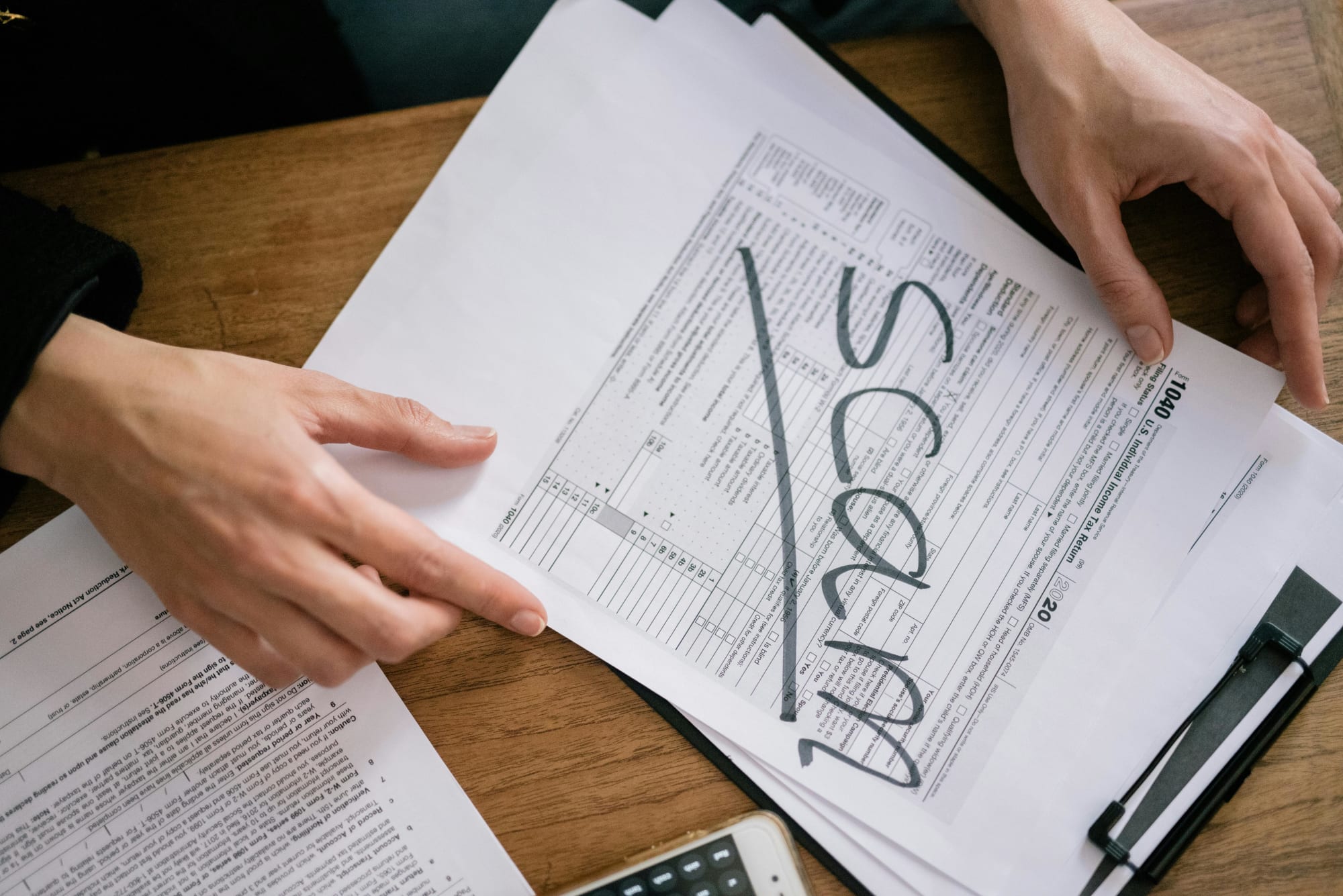Save
5 giveaway signs of stock market scams and how to avoid them
Have you ever seen a pop-up when scrolling through social media or websites claiming a certain platform, financial adviser or celebrity can help you make thousands by ‘investing’ in programs or vehicles that seem to have the secret sauce to making bank with stocks, commodities or crypto assets?
5 giveaway signs of stock market scams and how to avoid them
Have you ever seen a pop-up when scrolling through social media or websites claiming a certain platform, financial adviser or celebrity can help you make thousands by ‘investing’ in programs or vehicles that seem to have the secret sauce to making bank with stocks, commodities or crypto assets?

While some scams can stick out like a sore thumb, with less than impressive graphics and fake website links, others can appear somewhat legitimate, and even the most savvy Aussie investor can fall victim to these.
The Australian Competition and Consumer Commission's (ACCC) Scamwatch reported recently that last year alone, Australians lost $176.1 million to scams, up by almost 23 per cent in 2019. The number of scams also rose by 28.8 per cent with more than 216,000 reported in 2020.
As fears rise around losing hard-earned cash through potential scams, how do investors spot stock market scammers and, more importantly, how do they avoid them?
The common types of stock market scams

According to ACCC’s Scamwatch, there are a few types of common investment scams that many Australians are unfortunately victims to, including:
Investment cold calls: This is where a scammer cold-calls the victim, claiming to be a stockbroker or portfolio manager, often purporting to be associated with a high-profile ambassador. They claim to offer schemes with low-risk, high returns, or encourage victims to invest in overseas companies, often via unretrievable wire transfers.
These scammers will sound legitimate and say they have ‘resources’ to back up their false claims. It’s important to note that these scammers generally operate from overseas and will not have an Australian Financial Services Licence.
Share promotions: Here a scammer will contact the victim by email or social media, trying to offer a unique promotion, stressing that they must act quickly in order to redeem it.
They may ask that an initial capital ‘investment’ is transferred into an unknown bank account, promising to invest the money on behalf of the victim, but before long the money and the scammer will disappear.
Investment seminars: Either promoted by promising motivational speakers or ‘self-made billionaires’ who will provide the victim with expert investing advice. More often than not, these scammers will ask for large sums of money to provide the victim attendance to the seminar.
Impersonating financial institutions: This is where a scammer pretends to be from a reputable financial institution such as one of the big four banks asking for things like investments into new ‘stock market’ accounts, credentials to bank accounts, private keys to crypto wallets, or will claim to be chasing outstanding debts.
How to spot a stock market scammer
-
If the scammer approaches you by phone, it’s likely that the number will either be private or untraceable if you attempt to dial them back. When it comes to email addresses, the scammer’s email address may be from a strange domain, misspelled if they are pretending to be from a reputable company or using fake signatures. If the scammer claims to be from a certain company, try contacting them to confirm if the person does indeed work for them, or if the offer they are promoting is legitimate. Often scammers will name the “From” recipient label so that it looks real, but when you look at the actual address, it may be an impostor address set up via a free Gmail account.
-
There’s no verification process. Regulators demand that any new user that signs up to an online trading platform undergo a strict verification process, to ensure that all of the users on the platform are real. If there’s no verification process, it’s likely that it’s a scam. However, some scammers might create their own fake verification process, which in this case it’s important to be diligent to check other similar platforms to see where the gaps are or if there’s any inconsistencies in copy or processes. Remember, any legitimate institution will also verify themselves, and will be able to prove they are from the organisation they claim to be from. If you ask them questions they should be able to identify themselves. If you hear a pre-recorded message, it’s highly likely this is a scam – particularly if it contains a threat or warning.
-
You should always look at the provided browser’s address bar and check if the link is secure. You could also dive deeper into each platform’s information and see what kind of security measures they have in place.
-
They don’t have the relevant licences to be a registered professional adviser or investment platform, and if asked about it or requested to provide proof, they refuse or provide endless excuses.
-
The scammer asks you to pay for investments via credit card, gift card or wiring money abroad or to a personal account.
How to avoid stock market scams
- Never provide your details to an unsolicited caller or reply to emails offering financial advice or investment opportunities, just hang up or delete the email. If it’s a pop-up on a website, do not click it.
- Unless you visit a reputable website yourself, you should never share any personal or financial information with any third party.
- If someone asks you to falsify information on an application, or gives you a script to follow, this is another red flag.
- Reputable companies will never ask for your bank account information, passwords or private keys/wallet phrases, especially over email or text.
- If you aren’t sure if the platform you’re using, or if the person you’re speaking to is a scammer, get a second opinion from a trusted source, or you can check ASIC’s list of companies you should not deal with. If you believe you have been scammed, it’s important to contact your bank or financial institution immediately, as well as report the scam to the ACCC.
By Josh Gilbert, market analyst at global multi-asset at eToro

Scams
Holiday scams are now a P&L risk: Why Australian brands must treat cyber fraud as a growth problem, not just an IT issue
The festive fraud spike isn’t simply a consumer cautionary tale—it’s a balance sheet and brand-trust event for retailers, marketplaces and financial services. With AI‑assisted scams surging and ...Read more

Scams
Trend Micro forecasts a new era of AI-driven scams by 2026
In a comprehensive report released today, cybersecurity leader Trend Micro Incorporated warns that 2026 will mark a significant turning point in the evolution of scams, driven by artificial ...Read more

Scams
Australians urged to stay vigilant as holiday scammers ramp up activity
As the festive season approaches, Australians are being warned to be on high alert for a surge in scam activities. With the increase in online shopping, travel bookings, and holiday preparations, ...Read more

Scams
Scam alert: Trend Micro warns Aussies to be vigilant as Black Friday approaches
As Australians prepare to dive into Black Friday shopping, cybersecurity firm Trend Micro has issued a stark warning about a surge in scam activities targeting eager consumers. According to a recent ...Read more

Scams
Economic stress leaves Australians vulnerable to job and financial scams
As Australians brace for the holiday season, a significant increase in job and financial scams is raising alarms. New findings from global cybersecurity leader Trend Micro Incorporated reveal that ...Read more

Scams
AI-driven investment scams explode: Millions of fraudulent sites blocked, billions lost
In an alarming trend that has caught the attention of cybersecurity experts worldwide, the use of artificial intelligence (AI) in investment scams has surged dramatically. Between March and October ...Read more

Scams
From awareness to accountability: Banks turn scam prevention into a core P&L discipline
Scam Awareness Week is the headline, but the real story is a structural shift: fraud prevention is moving from compliance footnote to board-level performance driver. ANZ’s 15% reduction in scam losses ...Read more

Scams
Inside ANZ’s $100m scam‑fight playbook: how banks can turn awareness into prevention
Public-service messaging won’t stop modern scammers. Australia’s banks are moving from posters to prevention, blending AI, network controls and customer friction to change outcomes. ANZ’s program ...Read more

Scams
Holiday scams are now a P&L risk: Why Australian brands must treat cyber fraud as a growth problem, not just an IT issue
The festive fraud spike isn’t simply a consumer cautionary tale—it’s a balance sheet and brand-trust event for retailers, marketplaces and financial services. With AI‑assisted scams surging and ...Read more

Scams
Trend Micro forecasts a new era of AI-driven scams by 2026
In a comprehensive report released today, cybersecurity leader Trend Micro Incorporated warns that 2026 will mark a significant turning point in the evolution of scams, driven by artificial ...Read more

Scams
Australians urged to stay vigilant as holiday scammers ramp up activity
As the festive season approaches, Australians are being warned to be on high alert for a surge in scam activities. With the increase in online shopping, travel bookings, and holiday preparations, ...Read more

Scams
Scam alert: Trend Micro warns Aussies to be vigilant as Black Friday approaches
As Australians prepare to dive into Black Friday shopping, cybersecurity firm Trend Micro has issued a stark warning about a surge in scam activities targeting eager consumers. According to a recent ...Read more

Scams
Economic stress leaves Australians vulnerable to job and financial scams
As Australians brace for the holiday season, a significant increase in job and financial scams is raising alarms. New findings from global cybersecurity leader Trend Micro Incorporated reveal that ...Read more

Scams
AI-driven investment scams explode: Millions of fraudulent sites blocked, billions lost
In an alarming trend that has caught the attention of cybersecurity experts worldwide, the use of artificial intelligence (AI) in investment scams has surged dramatically. Between March and October ...Read more

Scams
From awareness to accountability: Banks turn scam prevention into a core P&L discipline
Scam Awareness Week is the headline, but the real story is a structural shift: fraud prevention is moving from compliance footnote to board-level performance driver. ANZ’s 15% reduction in scam losses ...Read more

Scams
Inside ANZ’s $100m scam‑fight playbook: how banks can turn awareness into prevention
Public-service messaging won’t stop modern scammers. Australia’s banks are moving from posters to prevention, blending AI, network controls and customer friction to change outcomes. ANZ’s program ...Read more













